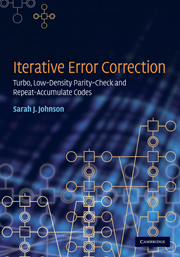Book contents
- Frontmatter
- Contents
- Preface
- Notation
- Commonly used abbreviations
- 1 Channels, codes and capacity
- 2 Low-density parity-check codes
- 3 Low-density parity-check codes: properties and constructions
- 4 Convolutional codes
- 5 Turbo codes
- 6 Serial concatenation and RA codes
- 7 Density evolution and EXIT charts
- 8 Error floor analysis
- References
- Index
8 - Error floor analysis
Published online by Cambridge University Press: 05 June 2012
- Frontmatter
- Contents
- Preface
- Notation
- Commonly used abbreviations
- 1 Channels, codes and capacity
- 2 Low-density parity-check codes
- 3 Low-density parity-check codes: properties and constructions
- 4 Convolutional codes
- 5 Turbo codes
- 6 Serial concatenation and RA codes
- 7 Density evolution and EXIT charts
- 8 Error floor analysis
- References
- Index
Summary
Introduction
In the previous chapter we analyzed the performance of iterative codes by calculating their threshold and thus comparing their performance in high-noise channels with the channel's capacity. In that analysis we considered the iterative decoding of code ensembles with given component codes, averaging over all possible interleaver–edge permutations. In this chapter we will also use the concept of code ensembles but will turn our focus to low-noise channels and consider the error floor performance of iterative code ensembles. Except for the special case of the binary erasure channel, our analysis will consider the properties of the codes independently of their respective iterative decoding algorithms. In fact, we will assume maximum likelihood (ML) decoding, for which the performance of a code depends only on its codeword weight distribution. Using ML analysis we can
demonstrate the source of the interleaver gain for iterative codes,
show why recursive encoders are so important for concatenated codes, and
show how the error floor performance of iterative codes depends on the chosen component codes.
Lastly, for the special case of the binary erasure channel we will use the concept of stopping sets to analyze the finite-length performance of LDPC ensembles and message-passing decoding.
Maximum likelihood analysis
Although it is impractical to decode the long, pseudo-random, codes designed for iterative decoding using ML decoding, the ML decoder is the best possible decoder (assuming equiprobable source symbols) and so provides an upper bound on the performance of iterative decoders.
- Type
- Chapter
- Information
- Iterative Error CorrectionTurbo, Low-Density Parity-Check and Repeat-Accumulate Codes, pp. 283 - 321Publisher: Cambridge University PressPrint publication year: 2009



